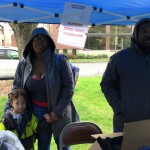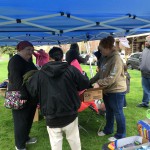

Mission Statement
Our vision at Love Thy Neighbor is to be an organization supporting and insuring no individuals or families in our communities ever have to go hungry or spend a night on the streets or in the woods because they can’t find or afford safe housing. We believe in the principle that safe, affordable housing is a fundamental human right, and our primary aim is to offer a stabilizing base of support for homeless men and women as they transition back into the community. Our concern is for both emergency care and the development of affordable housing for all.
What We Do
We offer our assistance in acquiring: Food, Shelter, Veterans Services, Health Care, Clothing (Kids and Adult) Identification, Financial Assistance, Children’s Services, Job & Living Skills, Education & Self Help ,Classes. Community Care Support Services
Appreciation Letters
Good Afternoon, I wanted to thank you on behalf of Baker Middle School and the 25 families that each of you had a part in helping over the Thanksgiving holiday. You went above and beyond to support the Baker community. An example is when a female student was so happy and thankful that she was going to get to eat Thanksgiving dinner. Without your support that dinner wouldn’t have happened because her mother didn’t get paid until after Thanksgiving. Again, thank you so much for your generosity and community work that you do. Baker Middle School
Community First
Supporters
Myth: Homeless people are all drunks and drug users. We’re just enabling them!
FACT: Research shows that substance abuse is often a result of homelessness, rather than a cause. Roughly 32% of individuals experiencing homelessness suffer from addiction to drugs and alcohol—a figure approximately 20%
higher than reported abuse of alcohol and illicit drugs by the general population. Homelessness, which is usually accompanied by loss of income, isolation, and loss of self-worth, drives people to substance abuse. It is often mistakenly assumed that alcoholics and drug users lack moral principles or willpower and that they could stop using drugs simply by choosing to change their behavior. Recovering from addiction is difficult for housed people; it is even more difficult for people experiencing the additional trauma of homelessness. (Sources: http://bit.ly/29g5VP2; http://bit.ly/29uiKq0; http://bit.ly/29m10t9
Myth: Homeless people just lack ambition.

FACT: Research shows that substance abuse is often a result of homelessness, rather than a cause. Roughly 32% of individuals experiencing homelessness suffer from addiction to drugs and alcohol—a figure approximately 20%
higher than reported abuse of alcohol and illicit drugs by the general population. Homelessness, which is usually accompanied by loss of income, isolation, and loss of self-worth, drives people to substance abuse. It is often mistakenly assumed that alcoholics and drug users lack moral principles or willpower and that they could stop using drugs simply by choosing to change their behavior. Recovering from addiction is difficult for housed people; it is even more difficult for people experiencing the additional trauma of homelessness. (Sources: http://bit.ly/29g5VP2; http://bit.ly/29uiKq0; http://bit.ly/29m10t9
















